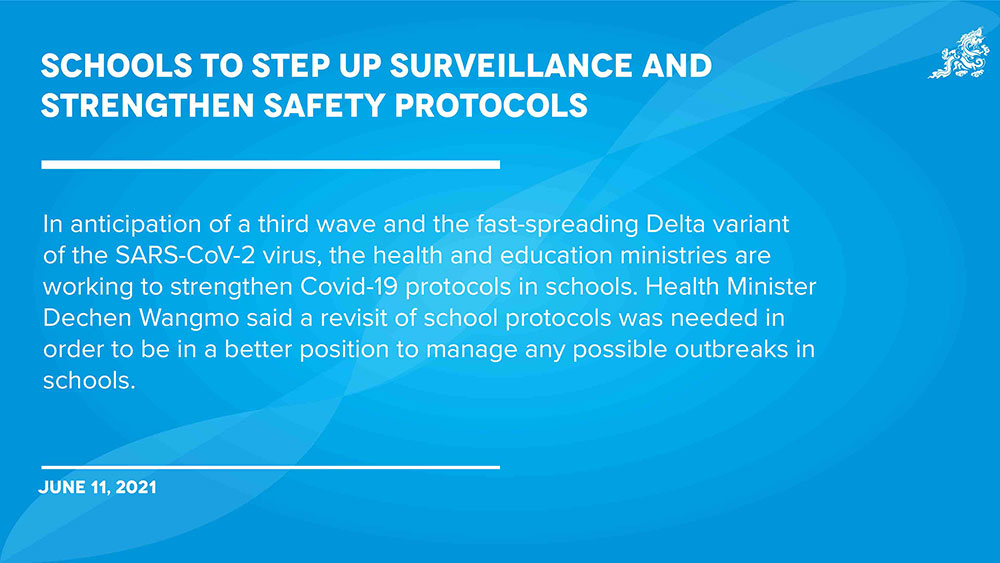…in anticipation of a third wave of the pandemic
Should there be a third wave of the Covid-19 pandemic, experts have warned that the most affected groups would be children, those suffering from chronic diseases, and those who are not vaccinated.
In anticipation of a third wave and the fast-spreading Delta variant of the SARS-CoV-2 virus, the health and education ministries are working together to strengthen the Covid-19 protocols in schools.
In a recent letter to the Sherig Lyonpo (education minister) Jai Bir Rai, Sowai Lyonpo (health minister) Dechen Wangmo said that the two ministries needed to revisit the school protocols in order to be in a better position to manage any possible outbreaks in the schools.
Sowai Lyonpo said that there was mounting evidence that the risk of hospital admission was higher in people infected by the Delta variant. There were multiple reports on the transmission being higher with this variant particularly in schools.
“Majority of our children in schools are anaemic and this, as a public health professional, I feel is a very worrying factor should an outbreak happen in the schools,” Lyonpo said. “We’ve more than 90 percent of our children in schools and an outbreak there could become a very serious problem for us.”
Despite having adequate measures and protocols in place, in view of the concerning developments, the minister said that any existing gaps needed to be plugged and measures strengthened.
“Our primary objective is to prevent any outbreaks from happening at all.
But, in case there is one, the objective then has to be to effectively mitigate the outbreak and save our children,” she said.
Sherig Lyonpo Jai Bir Rai said that during the pandemic, protecting children in schools remained a major challenge for the government mainly because of the large number. The country today has more than 168,000 students.
Lyonpo said that of the total, those students in the high-risk areas including Phuentsholing, Thimphu, and Paro were more vulnerable. Measures such as maintaining physical distance, temperature checkups, and awareness of safety protocols were being consistently followed in all schools, he added.
In the event of a lockdown, Lyonpo said that the ministry had devised various online learning platforms including assessment procedures and preparing children psychologically for such a situation.
“However, despite all these measures, the most effective solution I see is if people take individual responsibility in containing the disease,” the minister said.
“Children get infected from their parents. So, if parents and the community take this collective responsibility and follow preventive protocols, the frequency of outbreaks would be minimal,” he said.
Meanwhile, officials from the two ministries would meet next week to deliberate on further strengthening the existing protocols in schools.
Sowai Lyonpo said: “While we have an active surveillance in the schools where 10 percent of students are tested regularly, we are considering putting additional surveillance.”
In anticipation of more children testing positive, a children’s ward has also been established at the newly equipped Covid-19 isolation hospital in Phuentsholing.
By Younten Tshedup
Edited by Tshering Palden


